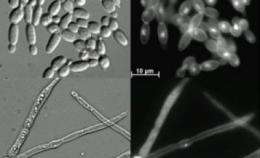Vitamin B3 as a novel approach to treat fungal infections

A team of scientists from the Institute for Research in Immunology and Cancer (IRIC) of the University of Montreal have identified vitamin B3 as a potential antifungal treatment. Led by IRIC Principal Investigators Martine Raymond, Alain Verreault and Pierre Thibault, in collaboration with Alaka Mullick, from the Biotechnology Research Institute of the National Research Council Canada, the study is the subject of a recent article in Nature Medicine.
Infections by the yeast Candida albicans represent a significant public health problem and a common complication in immunodeficient individuals such as AIDS patients, cancer patients undergoing chemotherapy and recipients of organ transplants. While some treatments are available, their efficacy can be compromised by the emergence of drug-resistant strains.
The current study shows that a C. albicans enzyme, known as Hst3, is essential to the growth and survival of the yeast. Researchers found that genetic or pharmacological inhibition of Hst3 with nicotinamide, a form of vitamin B3, strongly reduced C. albicans virulence in a mouse model. Both normal and drug-resistant strains of C. albicans were susceptible to nicotinamide. In addition, nicotinamide prevented the growth of other pathogenic Candida species and Aspergillus fumigatus (another human pathogen), thus demonstrating the broad antifungal properties of nicotinamide.
"There is an urgent need to develop new therapies to kill C. albicans because it is one of the leading causes of hospital-acquired infections and is associated with high mortality rates," explains Martine Raymond, who is also a professor at the University of Montreal Department of Biochemistry. "Although many issues remain to be investigated, the results of our study are very exciting and they constitute an important first step in the development of new therapeutic agents to treat fungal infections without major side effects for patients."
More information: The article, "Modulation of histone H3 lysine 56 acetylation as an antifungal therapeutic strategy," published in Nature Medicine, was authored by Hugo Wurtele, Sarah Tsao, Guylaine Lépine, Alaka Mullick, Jessy Tremblay, Paul Drogaris, Eun-Hye Lee, Pierre Thibault, Alain Verreault and Martine Raymond. www.nature.com/nm/journal/v16/n7/full/nm.2175.html















